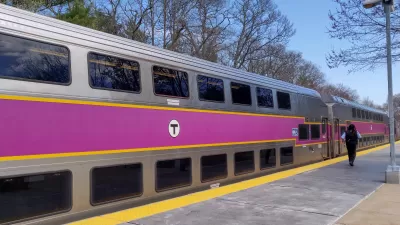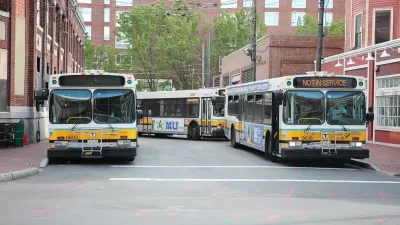The bus lanes have improved travel times, but who should cover the costs isn't entirely clear.

Adam Vaccaro reports that a bus-only lane started last year is significantly speeding up buses traveling on Washington Street. Both the city and the Massachusetts Bay Transportation Authority agree that the lane is a success and an improvement that can be widely used in the region.
"But it has also raised a tough question: Who is responsible for managing these additions to the roads — the state-run transit agency that owns the buses or the city that owns the streets?" says Vaccaro.
The city is suggesting that the MBTA should help support the next phase of the project by covering expenses such as signage and paint for the lanes. While costs normally are the responsibility of a city or town, Boston pays more to the MBTA through assessments than any other municipality.
"Activists see this as the kind of typical Boston-area jurisdictional dispute that threatens to slow adoption of a transportation improvement at a critical time," reports Vaccaro. Still, bus lanes are faring well, and both state and local officials are heralding them as a cost-effective solution for tackling regional traffic problems.
While the issue of financial contributions remains up in the air, more lanes are are on the horizon, reports Vaccaro:
The [Marty] Walsh administration plans to hire the city’s first-ever transit director to work directly with the T on planning and implementing bus lanes, as well as other staffers to monitor them on a daily basis. City officials said that they expect to discuss the issue with new MBTA general manager Steve Poftak — whose appointment was praised by Walsh — who started the job this week.
MBTA officials say they are working with the city to resolve the issue, and advocates say they would like to see a signed agreement between the agency and the city.
FULL STORY: Boston’s new bus-only lanes are an improvement. But who will pay for them?

Alabama: Trump Terminates Settlements for Black Communities Harmed By Raw Sewage
Trump deemed the landmark civil rights agreement “illegal DEI and environmental justice policy.”

Planetizen Federal Action Tracker
A weekly monitor of how Trump’s orders and actions are impacting planners and planning in America.

The 120 Year Old Tiny Home Villages That Sheltered San Francisco’s Earthquake Refugees
More than a century ago, San Francisco mobilized to house thousands of residents displaced by the 1906 earthquake. Could their strategy offer a model for the present?

San Francisco Opens Park on Former Great Highway
The Sunset Dunes park’s grand opening attracted both fans and detractors.

Oregon Legislature to Consider Transit Funding Laws
One proposal would increase the state’s payroll tax by .08% to fund transit agencies and expand service.

Housing Vouchers as a Key Piece of Houston’s Housing Strategy
The Houston Housing Authority supports 19,000 households through the housing voucher program.
Urban Design for Planners 1: Software Tools
This six-course series explores essential urban design concepts using open source software and equips planners with the tools they need to participate fully in the urban design process.
Planning for Universal Design
Learn the tools for implementing Universal Design in planning regulations.
Clanton & Associates, Inc.
Jessamine County Fiscal Court
Institute for Housing and Urban Development Studies (IHS)
City of Grandview
Harvard GSD Executive Education
Toledo-Lucas County Plan Commissions
Salt Lake City
NYU Wagner Graduate School of Public Service





























